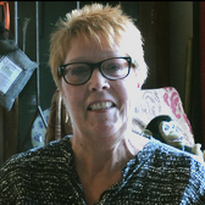Louise

Louise is part of a birth cohort study. When she was four, she did IQ and puzzle tests as part of the study. She is excited to continue participating in the study to help others and to inform health policy.
Louise is married and has one adult child. She is a carer and development worker in the voluntary sector. Her ethnic background is White Scottish.
More about me...
Louise is part of a birth cohort study which she joined when she was a child. She is unsure why she was selected but remembers feeling excited to be a participant. She thinks she was four when she first joined and remembers taking an IQ test and solving puzzles as part of the study. At first, she thought these tests were part of the school curriculum but, after some recent contact with the researchers, she has been told they were part of the birth cohort study. She does not remember participating in the tests after secondary school and thinks this is because she moved location. When she moved back to her original location in the 1990s, however, she received a letter inviting her to once again participate in the study.
She completed a survey which included questions about her health, her education, relationships and lifestyle, and she gave the researchers permission to access her medical records. Louise was also invited to a get-together where she met others who were part of the study and were updated on the research findings. She was disappointed that there was nobody she knew at the reunion as she thought people from her primary school would have attended.
When Louise was invited back to the study in the 1990s, she was excited. She describes herself as being happy to participate in anything, especially if it is going to help society and inform health and social policy. She used to receive Christmas cards and newsletters. She would like to know more about her contributions and as such she has joined the birth cohort study’s Facebook page where the researchers post feedback, or she looks at the research team’s website to learn more about the study. Because of her engagement with this page, she has learnt that the birth cohort study was about her generations’ health and how their experiences have shaped their life journey. She would like to know more information about this and what the research team are doing with her data. Through the birth cohort study’s Facebook page, she was also able to volunteer for additional studies as she would like to be more involved in the study.
Louise encourages others to take part in cohort studies if they are interested in how people live and how society operates. She thinks that if people get the opportunity to take part in a research study then it would be worthwhile to help others. Her message to researchers of cohort studies is to involve participants more in their studies and to give them more information about what they are doing with their data.
Interview conducted in 2019.
Louise thinks it’s important to contribute to long-term studies which can develop understanding and knowledge of how society operates.
Louise thinks it’s important to contribute to long-term studies which can develop understanding and knowledge of how society operates.
I would encourage them to, you know, if they’re at all interested in how people live and how society operates, I think, to be part of something that feeds into that is extremely important.
Okay and why do you think it’s important?
Because we need to know how society operates, how it works and we can only do that by studying it; by studying people; studying patterns of behaviour; studying opportunities; choice and so I think if you get the opportunity to participate in something like this, then it would be very worthwhile.
Louise used to receive Christmas cards and newsletters but now she looks on the cohort study team’s Facebook page and website. She was invited to participate in a sub-study through the Facebook page.
Louise used to receive Christmas cards and newsletters but now she looks on the cohort study team’s Facebook page and website. She was invited to participate in a sub-study through the Facebook page.
They used to send us much more sort of things like-, they used to send us Christmas cards every Christmas with a newsletter and updating us. Now we’ve got to be more proactive; got to keep up with their Facebook page or go onto their website and check out what’s there.
Okay.
So it’s depends how, how-, I don’t know what’s the word, yes, you’ve got to be more proactive. They’re not telling you and I perfectly understand that, so I’ve got to keep reminding myself every so often, ‘Right, Louise, if you want to find out any more about this you’ve got to make an effort’, you know.
Look on the website?
Yes, and it’s not a big deal but it’s sometimes easy to forget.

